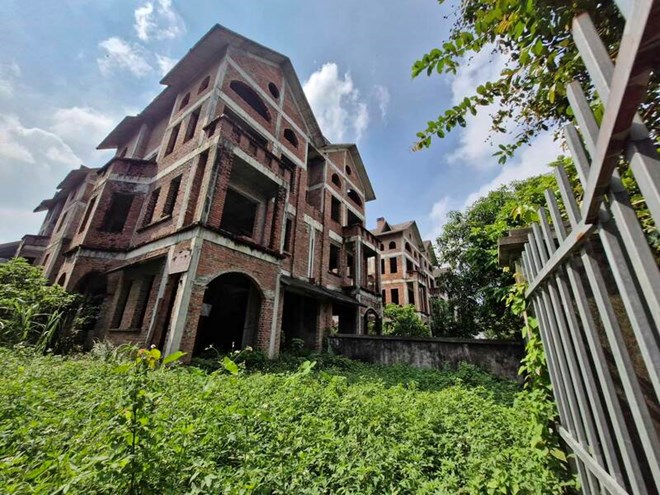For many years, Mr. Nguyen Van Nghia (Phu Tho province) and his wife, who are scrap collectors, have still taken advantage of the land grown in a townhouse with no one living in Duong Noi urban area (Hanoi) to grow vegetables and improve meals.
"This house has 3 floors, the exterior is completed, and the inside is unfinished, the owner is also from the same hometown, so my husband and I stayed there to look after it. 5 years ago, I came here like this, I stayed here every day," said Mr. Nghia.
According to the reporter's records, in Duong Noi urban area, there are hundreds of townhouses and villas in such a situation. Some houses have caregivers, the premises are used for growing vegetables to raise chickens. The rest are mostly abandoned, the doors are closed, many houses have become mossy and peeling over time.
Meanwhile, the transfer value in the free market of these houses is very large. On average, each townhouse costs from 12 to 15 billion VND, villas are sold from 40 to 80 billion VND, depending on location and area.

In fact, not only in Hanoi, but in many other localities, it is not difficult to find real estate projects from land to townhouses, villas in a state of disuse, so that after the project is completed and there are buyers.
The cause of this situation stems from the wave of real estate investment. Many people with stable finances are willing to spend billions of VND on real estate waiting for prices to increase. Many people also borrow and mortgage from banks for investment. And so, millions of billions of VND have been lying idle in the ground.
According to statistics, about 4.1 million billion VND has been lent by credit institutions in the real estate sector. This figure is nearly 4 times higher than the country's public investment capital in 2025.
The real estate sector only directly contributes about 3.5% of GDP, but attracts nearly 1/4 of the total capital of the entire economy. That has shown that the efficiency of capital for the real estate sector in growth is very low.
Many economic experts believe that when credit capital is poured too much into real estate, it will directly affect other economic sectors in society, especially the production, trade and service sectors. Because real estate only benefits a group of people, not brings jobs to the majority of workers in society.
Dr. Pham Thi Hoang Anh - Deputy Director of the Banking Academy said that mortgaged assets mainly come from the real estate market. Therefore, if the real estate market passes through a bubble period, it will fall into recession, which will pose risks to the banking and financial system, especially related to bad debt.
From the perspective of urban planning, Mr. Dao Ngoc Nghiem - Vice President of the Vietnam Urban Planning and Development Association said that in addition to wasting a huge resource of society, the situation of abandoned real estate due to speculation also makes the urban face shabby and unsightly.
"If the loopholes in management and planning mechanisms are not overcome, in the future, many large cities across the country will have more abandoned villas and houses, creating negative consequences for the city," said Mr. Dao Ngoc Nghiem.











